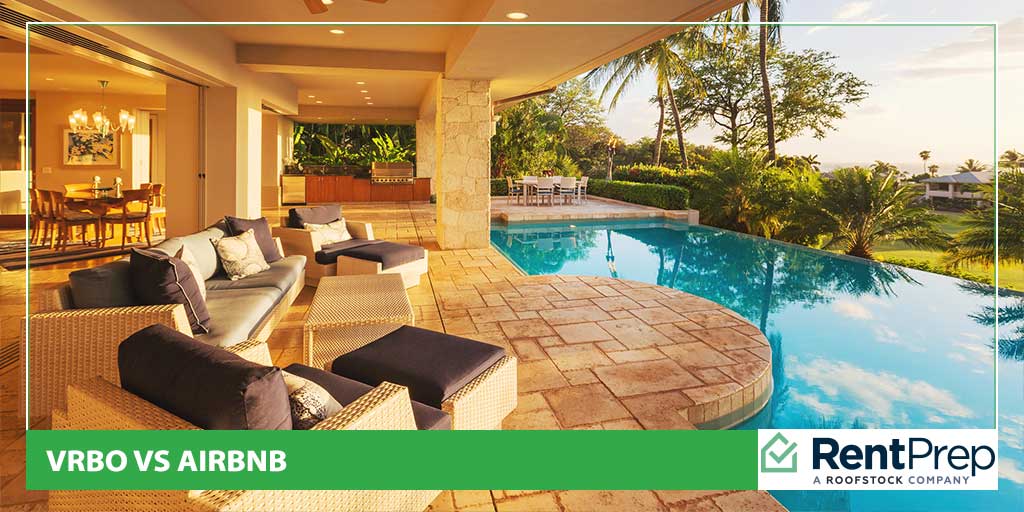
Do you want to make more money from your rental property? You can join the new trend of renting it to people who need a place to stay for a short time. These are usually travelers who prefer a homey environment over a traditional hotel.
There are currently two big names for listing your property in the short-term rental market: Airbnb and VRBO.
This is a great option if you have a property in a popular tourist area that is not occupied all the time. You can rent it out for a few days or weeks instead of looking for long-term tenants. Or you can rent out part of your own home, like a spare room or an in-law suite, and earn some extra cash. You can even stay somewhere else while your guests enjoy your place.
But renting your property for short-term stays is not easy. You need to manage the bookings, the cleanings, the check-ins, and the reviews. And you need to choose the best platform to advertise your property and reach your target audience.
So, which one is better for your property: Airbnb vs VRBO? In this article, we’ll compare these two services in terms of the fees, the rules, the insurance, and more. Read on to find out which platform suits your needs best.
Spoiler Alert! While VRBO can be the best choice in certain circumstances, in most cases Airbnb is the winner. It dominates the market and has the largest audience; therefore, it’s more likely to generate leads.
Contents For Airbnb vs VRBO For Landlords
In our guide, we’ll compare Airbnb and VRBO on various points, from fees to audience to flexibility.
- Airbnb vs VRBO: Types Of Properties
- Airbnb vs VRBO: Lead Generation
- Airbnb vs VRBO: Income And Fees
- Airbnb vs VRBO: Cancellation Policies
- Airbnb vs VRBO: Insurance
- Airbnb vs VRBO: Reviews
- Airbnb vs VRBO: The Verdict
- FAQs
- Getting Start With Short-Term Rentals
Airbnb vs VRBO: Types Of Properties

While we talk about Airbnb and VRBO as equal alternatives, they don’t offer the same service.
VRBO allows you to rent out your entire property to travelers who want to have the place to themselves.
Airbnb on the other hand is more flexible and more embedded in the sharing economy in that, in addition to renting out your full property, you can choose to rent out part of your property as a shared space.
For example, if you have a spare room or a pool house, you can rent out just that part of the property. Some tenants prefer this arrangement because they have more personal contact with you, so you can help them navigate the local area.
The flexibility of Airbnb’s platform means it can even accommodate listings for hotel-style rooms and serviced apartments. This is clearly an advantage.
Airbnb vs VRBO: Lead Generation
When we talk about lead generation, we’re referring to how likely you are to find tenants to rent out your home and generate income via the platform. Airbnb is a hands-down winner in this case. It has successfully grown to dominate the market, and its name has become a byword for this kind of shared economy rental. According to SEMRush, Airbnb got 75.9 million visits in the last year compared to VRBO’s 22.4 million.
A greater number of properties are also listed on Airbnb, which in theory suggests there’s more competition. Your property may appear more visible on VRBO, when there are only a handful of properties in the area. But realistically, VRBO users are probably searching more than one platform for appropriate properties.
However, there are some benefits to VRBO when it comes to its audience. Airbnb’s audience could be characterized as anyone and everyone. Anyone looking for this kind of rental will probably log onto Airbnb first. This means you might have a lot of people who have never done this kind of short-term rental before and aren’t very familiar with the rules, and more groups organizing events such as bachelor parties and family reunions.
The nature of VRBO’s listings means they attract a different audience. Since they only deal with complete properties, they tend to be regular travelers with that kind of rental in mind. Since VRBO is also less well-known than Airbnb, you tend to get more experienced short-term renters who know what they’re looking for and have rented on a short-term basis before.
So, while Airbnb certainly has the edge when it comes to audience size, if you’re working with a larger or luxury property, listing on VRBO could be one step toward prescreening your potential audience.
Airbnb vs VRBO: Income And Fees
Both Airbnb and VRBO let you decide how much your property is worth on any given day. They also provide tools that let you analyze the market for similar short-term rentals so you can establish a reasonable yet competitive price. But, of course, both charge fees. Both you and the tenant must pay some of them.
Airbnb offers you a few options when it comes to fees. The first is a split fee where you pay a 3% fee every time you make a booking through the site, while the tenant pays a 12-14% fee depending on a variety of market factors.
Your other option is to pay all the fees, which will be 14-16%, and your tenant sees 0% fees. Naturally, as a landlord, you’ll have to factor this into your rental price to cover the cost.
Airbnb also allows you to apply a cleaning fee, which is standard for most short-term rentals, and allows you to offer long-stay discounts, giving tenants a percentage discount if they stay for more than a certain number of days.
VRBO also has two fee options. The first is that you pay an annual subscription fee of $499 for your property. This works well for high-volume properties. Your second option is to pay fees starting from 8% every time you rent the property.
There are no options for removing tenant fees. They will pay 6-12% on every rental. You can apply a cleaning fee set by you, but there are no options for long-term discounts.
This matters because many tenants who want to stay long term will make a short-term booking and then negotiate with you directly for a long-term stay. While there’s nothing wrong with that, the insurance coverage you get when you list online won’t cover you for these side bookings. Airbnb’s facility to offer long-term discounts means you can keep the rental “on the books” while still offering a better rate.
Calculating fees and how they eat into your profits is probably one of the biggest headaches associated with short-term rentals, but Airbnb’s flexibility is a bonus.
Airbnb vs VRBO: Cancellation Policies

Both Airbnb and VRBO offer a selection of cancellation policies that can be strict no-refund guidelines or more flexible policies that offer a 50% or 100% refund depending on how far in advance the renter cancels.
This is another area where Airbnb is more flexible than VRBO. The most lenient policy offered by VRBO is called 14/7, which means a 100% refund if they cancel 14 days in advance and a 50% refund if they cancel seven days in advance.
Airbnb has strict no refund policies and policies that match the 14/7, but they also let you issue a full refund if the tenant cancels within 24 hours.
While this seems more beneficial to the tenant than the landlord, there may be situations in which you want to offer this level of flexibility, and with VRBO you just can’t. On both platforms, you can change your policy whenever you want to.
Airbnb vs VRBO: Insurance
Both Airbnb and VRBO offer a certain level of insurance coverage when you list your property. It only applies to bookings made through their platform. Again, Airbnb’s offering is just a bit more comprehensive than VRBO’s.
VRBO offers up to $1 million primary liability insurance, which covers you if a tenant decides to sue you for something that happened while they were staying at the property. Airbnb offers the same liability coverage, but also adds up to $3 million in property protection to pay for theft and damage caused by tenants. This is important because contents insurance often won’t cover theft and damage caused by guests, and would consider your Airbnb tenants to be guests.
Airbnb vs VRBO: Reviews
Reviews are incredibly important to making the sharing economy work! Potential tenants will trust what previous tenants say about you more than what you say about yourself. Honest host reviews also help you identify tenants who are more likely to cause problems.
Airbnb has a fairly strict review system. Both you and the tenant have only two weeks to leave a review, while the events are still fresh in your mind. VRBO allows a full year before reviews are blocked.
There are benefits to both approaches, since two weeks can seem like a very short window when you’re busy. But awareness of the deadline and reminder emails mean that tenants are more likely to leave a review and that it’s more likely to be accurate.
Airbnb vs VRBO: The Verdict
While Airbnb and VRBO are both excellent sites for marketing your home for short-term rentals and managing tenants, this isn’t a tight competition.
Airbnb is newer than VRBO. It launched in 2007, while VRBO has been around since 1995. But Airbnb has made major investment in marketing and as such has managed to make itself the bigger name in the market. This means that if you’re looking for a large potential audience for your property, you’ll find them on Airbnb.
Airbnb also caters to a wider range of properties. This requires that they provide more flexibility in what they allow, which means you have more options as a landlord.
However, if you have a large or luxury property, listing with VRBO can help you “pre-screen” potential tenants since it’s more likely to attract experienced short-term renters with the budget to pay for a larger property.
Just starting out in the rental business? Download or landlord starter kit for a checklist of everything you need to know.
VRBO vs Airbnb FAQs
Below you’ll find answers to some of the questions about Airbnb and VRBO most frequently asked by landlords.
What is the 90-day rule?
In London, you cannot rent out a property on a short-term basis for more than 90 days per calendar year. Some sites, such as Airbnb, will automatically close bookings to your property once this limit has been reached. But these rules do not apply elsewhere in the world.
In the United States, you can rent your home out for 14 days per year without paying tax on your income from the rental.
Can you merge VRBO and Airbnb?
If you would like to list your property on both VRBO and Airbnb, you can, but to avoid double bookings you’ll need to synchronize your availability calendar using a channel manager such as Hosthub.
Getting Started With Short-Term Rentals
As with most things, the best platform for you to use when listing your property for short-term rentals depends on the type of property you have and the type of tenants you’re looking for.
However, it is safe to say that you’ll reach a bigger market with Airbnb and that it offers more flexibility. But VRBO offers benefits if you are specifically working with large or luxury properties.
Just as important as choosing the right platform for marketing and renting your property is preparing it for short-term rental. This means investing in furnishings and amenities and excellent photos to show off your property. Little things can go a long way when people are looking for a home away from home. Good Wi-Fi and access to a coffee machine can make all the difference.
Read our complete guide to short-term renting and guests.

